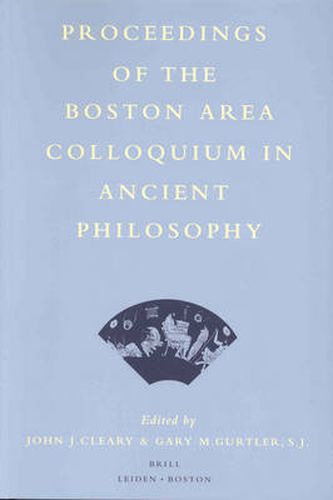Readings Newsletter
Become a Readings Member to make your shopping experience even easier.
Sign in or sign up for free!
You’re not far away from qualifying for FREE standard shipping within Australia
You’ve qualified for FREE standard shipping within Australia
The cart is loading…






This volume represents the activities of BACAP during 1998-99. Three colloquia deal with Platonic texts. The first examines the myth of Atlantis in the Timaeus and Critias, the second focuses on self and knowledge in the Republic and the Phaedo, while the third explores the rhetoric of the Phaedrus. Aristotle is also treated in three colloquia. Two of these colloquia tease out different aspects of the De Anima; the analogy between sensing and knowing, and the implications of Aristotle’s account of perception for modern philosophy of mind. The third colloquium on Aristotle discusses recent interpretations of Metaphysics Zeta. The remaining two colloquia treat of Seneca’s Natural Questions and of the pre-history of Pyrrhonic skepticism. The first deals with Seneca’s partially successful attempt to write a literary masterpiece. The second discusses the philosophical milieu of Pyrrho and his early form of skepticism. The book should be of interest to institutes and academic libraries in classics and ancient philosophy, as well as specialists and graduate students in these disciplines.
$9.00 standard shipping within Australia
FREE standard shipping within Australia for orders over $100.00
Express & International shipping calculated at checkout
This volume represents the activities of BACAP during 1998-99. Three colloquia deal with Platonic texts. The first examines the myth of Atlantis in the Timaeus and Critias, the second focuses on self and knowledge in the Republic and the Phaedo, while the third explores the rhetoric of the Phaedrus. Aristotle is also treated in three colloquia. Two of these colloquia tease out different aspects of the De Anima; the analogy between sensing and knowing, and the implications of Aristotle’s account of perception for modern philosophy of mind. The third colloquium on Aristotle discusses recent interpretations of Metaphysics Zeta. The remaining two colloquia treat of Seneca’s Natural Questions and of the pre-history of Pyrrhonic skepticism. The first deals with Seneca’s partially successful attempt to write a literary masterpiece. The second discusses the philosophical milieu of Pyrrho and his early form of skepticism. The book should be of interest to institutes and academic libraries in classics and ancient philosophy, as well as specialists and graduate students in these disciplines.